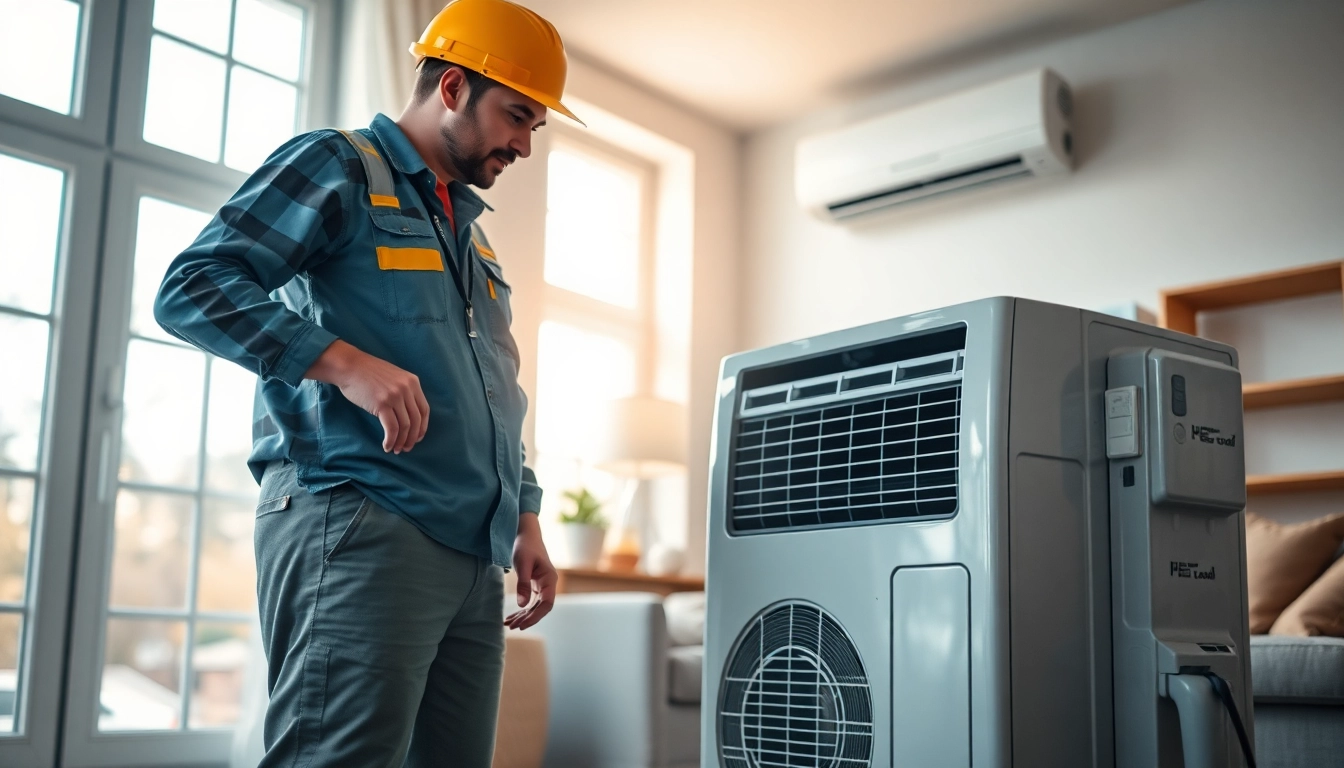Understanding Air Conditioning Replacement
When your air conditioning system shows signs of inefficiency or failure, it’s crucial to consider Air Conditioning replacement. Many homeowners don’t realize the importance of timely replacements, which can significantly impact comfort levels, energy bills, and overall home efficiency. In this article, we will delve deep into the concept of air conditioning replacement, exploring when to consider it, its benefits, and how to navigate the entire process effectively.
What is Air Conditioning Replacement?
Air conditioning replacement refers to the process of removing an old or malfunctioning air conditioning unit and installing a new one. This procedure is typically necessary when the existing system can no longer provide the desired cooling performance due to age, breakdown, or inefficiency. It involves not just the physical removal and installation of new equipment, but also considerations related to the home’s HVAC setup, sizing, and energy efficiency standards.
When to Consider Air Conditioning Replacement?
Knowing when to replace your air conditioning system can save you from unexpected costs and discomfort. It’s time to consider air conditioning replacement if:
- The system is over 10-15 years old, as older systems typically lose efficiency and may be outdated in technology.
- Your energy bills have noticeably increased despite consistent usage patterns, indicating declining efficiency.
- You experience uneven cooling throughout your home, which may suggest that your system is struggling to maintain set temperatures.
- Frequent repairs are required, leading to higher cumulative costs that could exceed replacement expenses.
- There are unusual noises or odors coming from the unit, which may indicate serious underlying issues.
Benefits of Air Conditioning Replacement
Engaging in air conditioning replacement offers numerous benefits:
- Energy Efficiency: Newer systems come with the latest technology that improves energy efficiency, leading to lower utility bills.
- Improved Comfort: Advanced systems provide better airflow and temperature control, significantly enhancing comfort in your home.
- Increased Home Value: A modern, efficient air conditioning system can boost your home’s resale value, making it more attractive to potential buyers.
- Reduced Repair Costs: With new equipment, the risk and cost of frequent repairs will diminish, providing peace of mind.
- Environmental Impact: Newer systems often use refrigerants that are less harmful to the environment, contributing to overall sustainability.
Choosing the Right System for Replacement
Selecting the right air conditioning system for replacement is crucial; the wrong choice could lead to discomfort and inefficiency. Here’s how to make an informed decision.
Types of Air Conditioning Systems
There are several types of air conditioning systems available for residential use:
- Central Air Conditioning: This type uses ducts to distribute cooled air throughout the home. It’s ideal for larger homes needing uniform cooling.
- Split-System Air Conditioners: These systems consist of an outdoor compressor and an indoor unit. They are versatile and suitable for various home sizes.
- Window Air Conditioners: A popular choice for smaller spaces, these units are easy to install in window frames and are cost-effective.
- Portable Air Conditioners: These units can be moved from room to room and do not require installation, making them flexible for temporary cooling needs.
- Geothermal Systems: Utilizing the earth’s constant temperature, these systems are energy-efficient and environmentally friendly, though they come with a higher initial cost.
Evaluating Efficiency Ratings for Air Conditioning Replacement
When choosing a new air conditioning system, efficiency ratings are paramount. Look for the Seasonal Energy Efficiency Ratio (SEER) rating, which measures how efficiently an air conditioner operates over a typical cooling season. A higher SEER rating signifies greater efficiency, which translates to lower operating costs.
In addition to SEER, consider the Energy Efficiency Ratio (EER) and the Energy Star certification, which indicate compliance with strict energy efficiency guidelines. Such systems not only ensure lower expenses but also contribute positively to the environment through reduced energy consumption.
Size and Installation Considerations for Air Conditioning Replacement
The size of your new air conditioning unit affects both comfort levels and energy efficiency. An undersized unit will struggle to cool your space effectively, while an oversized unit can cycle on and off too frequently, wasting energy. The right size is typically determined through a load calculation, which considers factors like:
- The total square footage of your home.
- The climate in your area.
- The number and size of windows.
- Insulation quality.
- The number of occupants in the house.
Professional installation is vital as it affects the unit’s performance. Poor installation can lead to airflow issues, energy loss, and additional wear and tear. Always hire licensed and experienced HVAC professionals for installation.
Preparing for Your Air Conditioning Replacement
Preparation is key to ensuring a smooth air conditioning replacement process. Here are the important steps to take.
Researching Local HVAC Professionals
Selecting a reliable HVAC professional can impact your installation experience significantly. When researching, consider:
- Checking online reviews and testimonials to gauge customer satisfaction.
- Confirming their licenses and certifications to ensure compliance with local laws and standards.
- Obtaining multiple quotes to compare price points and services offered.
- Asking for references from past clients to assess reliability and workmanship.
Budgeting for Air Conditioning Replacement
Understanding the financial aspect of air conditioning replacement is critical. On average, the cost of replacing an air conditioning system, including installation, can range from $3,000 to $8,000, depending on the system’s size and type. Additional costs may include:
- Modifications to existing ductwork.
- New thermostats and controls.
- Permits and inspections as mandated by local regulations.
It’s advisable to set aside extra funds for unexpected expenses that may arise during installation, such as discovering additional repairs needed on existing ductwork or electrical systems.
Permits and Regulations for Air Conditioning Replacement
Most local jurisdictions require permits for air conditioning replacement to ensure that the installation meets safety standards and local building codes. It’s vital to check with your local building authority to understand the necessary permits before proceeding. Additionally, hiring a licensed HVAC contractor typically ensures that they will handle all necessary permits on your behalf.
The Air Conditioning Replacement Process
The actual process of replacing your air conditioning system can seem daunting, but understanding what to expect can alleviate concerns. Here’s a breakdown of the steps involved.
Initial Consultation and Assessment Steps
Your HVAC professional will start the process with an initial consultation, during which they will:
- Evaluate your current system and assess its performance.
- Perform a comprehensive load calculation to determine the appropriate size for replacement.
- Discuss your preferences and budget considerations.
- Provide you with options for new systems and their associated costs.
This phase is crucial for ensuring that you make an informed choice tailored to your home’s needs.
Installation Day: What to Expect
On the installation day, preparation is essential for ensuring a smooth process. Here’s what generally occurs:
- The crew will arrive and prepare the installation site, ensuring minimal disruption to your home.
- Your old unit will be safely removed, and any necessary modifications to the ductwork or electrical systems will be made.
- The new system will be installed, ensuring all connections are secure and meet local codes.
- After installation, the crew will conduct a system check and explain how to operate your new unit.
Post-Installation Checks for Air Conditioning Replacement
After the installation, it’s important to conduct a few checks to ensure everything is functioning correctly:
- Confirm the thermostat settings and ensure they correspond with your preferences.
- Check for any unusual noises or smells during initial operation.
- Monitor the system performance over the first few weeks to ensure it’s cooling effectively.
- Schedule a follow-up appointment with your HVAC technician to address any issues that might arise.
Maintaining Your New Air Conditioning System
Regular maintenance is crucial to prolonging the life of your new air conditioning system. Here are some maintenance practices to consider:
Regular Maintenance Practices for Air Conditioning Systems
Routine maintenance tasks can help ensure your air conditioning unit runs smoothly. Consider the following:
- Change or clean the air filters every 1-3 months, depending on usage, to maintain optimal airflow.
- SCHEDULE regular maintenance inspections (at least once a year) with a qualified technician to examine key components.
- Keep the outdoor unit clear of debris, leaves, and grasses to enhance airflow and cooling efficiency.
- Inspect and clean the condensate drain to prevent clogs that can lead to water damage.
Signs that Your Air Conditioning Needs Attention
Being proactive about detecting issues can save you from costly repairs or replacements later on. Keep an eye out for signs that your system requires attention:
- Inconsistent temperatures in different areas of your home.
- Unusual noises, such as grinding or banging sounds during operation.
- Increased humidity levels indoors, which might indicate a malfunctioning unit.
- A noticeable spike in energy bills without a corresponding increase in usage.
Cost-Effectiveness of Timely Air Conditioning Replacement
Lastly, understanding the cost-effectiveness of timely air conditioning replacement is essential. While the initial investment may seem substantial, consider the long-term savings:
- New systems generally come with warranties that can lower repair costs over time.
- Improved energy efficiency leads to lower monthly utility bills, offsetting the replacement cost.
- A reliable air conditioning system contributes to a comfortable living environment, enhancing quality of life.
In summary, air conditioning replacement is not merely an expense; it is an investment in your home’s comfort, efficiency, and value. By understanding the replacement process, evaluating your options carefully, and maintaining your system diligently, you can enjoy a cooler, more comfortable living space for years to come.


